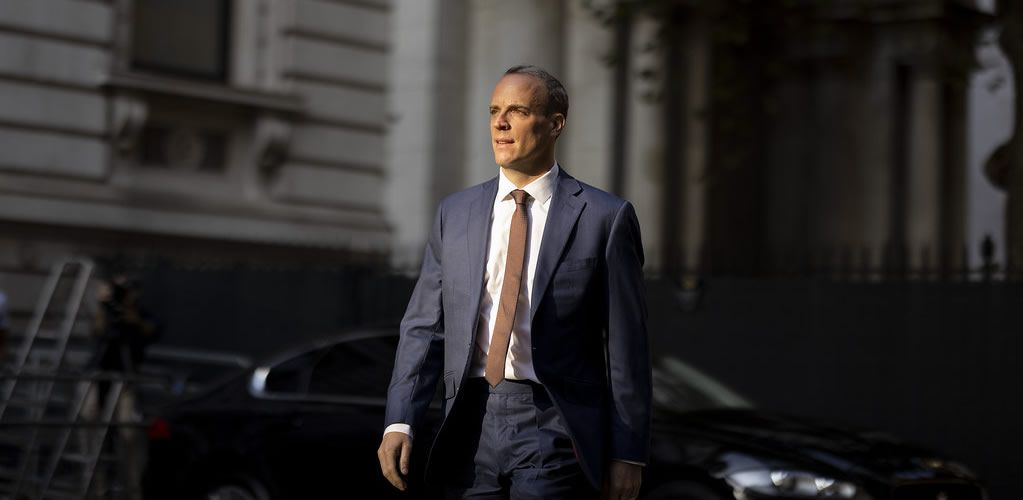Dominic Raab is right that the government has set a ‘dangerous precedent’ – but not for the reasons he thinks
A report found the deputy PM to have been abrasive and intimidating to civil servants who have waited months for action to be taken. Dominic Raab’s case leaves current and future victims of ministerial bullying unsure if their grievances will be taken seriously.

A report found the deputy PM to have been abrasive and intimidating to civil servants who have waited months for action to be taken. Dominic Raab’s case leaves current and future victims of ministerial bullying unsure if their grievances will be taken seriously.
D ominic Raab has resigned as deputy prime minister and secretary of state for justice following an investigation of accusations that he bullied civil servants.
However, his resignation letter contained no apology and barely any admission of guilt. He instead said that he felt “duty bound” to accept the findings of the investigation against him but that he believes they were “flawed and set a dangerous precedent for the conduct of good government”.
My resignation statement.👇 pic.twitter.com/DLjBfChlFq
— Dominic Raab (@DominicRaab) April 21, 2023
And yet while the report cleared Raab of intentionally targeting staff, it found that he had acted “abrasively” towards civil servants and in a way that was intimidating. Overall, the report paints a picture of a demanding secretary of state who routinely interrogated staff about their work without much thought for how they would be affected. It stated:
Adam Tolley, the lawyer who put the report together, noted that Raab has “been able to regulate this level of abrasiveness” since the allegations were made public and ought to have done so sooner.
Delay and denial
The civil servants who came forward about Raab have not been afforded the same treatment as employees in any private company in the UK have the right to expect.
The investigation into Raab’s conduct was launched in November 2022 – more than five months ago. It has therefore taken far longer to get to the bottom of this situation than would be the norm in any other workplace.
In the meantime, staff have had to continue to work with Raab. It was decided fairly early on that he would not be suspended from his position while Tolley looked into the complaints against him.
It is not standard practice to allow someone facing multiple credible accusations of bullying to continue to work with more junior colleagues while the claims are being considered. Civil servants have been left with the message that their negative experiences at work come second to Raab’s political career.

Dominic Raab visits Qatar in 2021. | CREDIT: FLICKR/NUMBER 10
Politics over principle
Discussion around Raab’s fate has been consistently tied to his loyalty to Prime Minister Rishi Sunak and whether the Conservative party can survive another scandal. The decision on how to sanction Raab ultimately came down to the prime minister, who appears to have spent months making political calculations on the matter, implying that he was looking for a reason not to take action.
Raab has displayed immense loyalty to Sunak, continuing to back him for the leadership of the Conservative Party in the summer of 2022 even when it became patently clear that his rival Liz Truss was on course to win the contest. But these factors should never have played a part in decisions around Raab’s professional conduct towards civil servants.
The UK government has a duty of care to the health and wellbeing of its employees, who should be able to expect a fair process that is entirely separate from the political pressures being faced by the party of government or the personal patronage of the accused.
Sunak’s personal conflicts of interest have manifestly played a part in how the decisions around Raab were made, from the length of time it took to investigate to the delay in publishing Tolley’s findings, even after Raab’s resignation letter was made public. This would not be acceptable in a private sector organisation.

Dominic Raab visits Israel in 2021. | CREDIT: FLICKR/NUMBER 10
Collateral damage
The result of these delays and the way the allegations have been handled will have lasting consequences for government staff, who cannot have been left feeling confident that their experiences have be taken seriously or dealt with effectively, even if the end result was, eventually, Raab’s departure. This is not conducive to a healthy and efficient work environment.
In a large-scale study of more than 5,000 people across the UK, my colleagues and I found that bullying in the workplace left victims not only feeling unhappy and insecure while at work but with a higher chance of increased drug and excessive alcohol usage and relationship difficulties in their personal lives.
And if their own experiences are not enough for these matters to be taken seriously, their victimisation has a negative impact for their employers too. Bullied staff take more sick days than the average worker and are less productive.
We also found that it is not only direct victims that suffer in a workplace where bullying takes place. Witnesses to the bullying and people who have been previously victimised but are not the subject of current bullying also take more sick leave than average. A ripple effect is evident when people at the top abuse their power.
Given the nature of Raab’s departure, current and future victims of ministerial bullying can hardly be reassured that their suffering will be taken seriously if they ever feel brave enough to speak out against their bosses.
What did Adam Tolley write in his report about Dominic Raab’s conduct at the Ministry of Justice?
“On a number of occasions at meetings with policy officials, the DPM acted in a manner which was intimidating, in the sense of going further than was necessary or appropriate in delivering critical feedback, and also insulting, in the sense of making unconstructive critical comments about the quality of work done (whether or not as a matter of substance any criticism was justified). By way of example, he complained about the absence of what he referred to as ‘basic information’ or ‘the basics’, about ‘obstructiveness’ on the part of officials whom he perceived to be resistant to his policies, and described some work as ‘utterly useless’ and ‘woeful’.
“The DPM did not intend by the conduct described to upset or humiliate. Nor did he target anyone for a specific type of treatment.
“His interruptive style is not itself behaviour that could be regarded as intimidating or insulting. However, individuals who had previously experienced the DPM express an unconstructive criticism of their work (and understood it as a criticism of them personally) might reasonably have interpreted a series of interruptions as a form of implicit criticism. The combination of unconstructive critical feedback and regular interruption is likely to be experienced as intimidating, in the sense of being unreasonably difficult to deal with, and plainly was so experienced by some individuals.”
(Source: Investigation Report)

GOING FURTHER:
— AUTHOR —

|
▫ Professor Sir Cary Cooper, Professor of Organisational Psychology and Health, University of Manchester -- One of the world’s leading authorities on health and well-being in the workplace. |

|

|

|
Sources
▪ Text: This piece was originally published in The Conversation and re-published in PMP Magazine on 21 April 2023. | The author writes in a personal capacity.
▪ Cover: Flickr/Number 10. - Dominic Raab. (Licensed under a Creative Commons Attribution-ShareAlike 4.0 International License.)






[Read our Comments Guidelines]